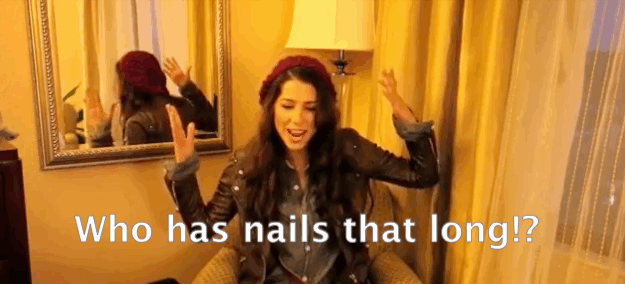In the past years when talking about myself I would use the word “gay” or between close friends even jokingly “faggot”. It took a long time before I got friendly with the word “lesbian”, because of its negative associations. However, the more I think, rethink and read about it, the more I feel the actual importance of using “the L word”.
I always had problems with the word lesbian. On one hand the idea of being stereotyped as the masculine butch was kind of inconvenient - which makes me ashamed, because this inconvenience actually means a form of homophobia that we fight so hard to eliminate. On the other hand I was so disturbed by considered being on the same page as the enormous artificial nailed, fake lesbians who tend to appear in lesbian porn.

The expressions and labels we use are very important and determinative for several reasons. One or two generations ago there were mostly gays, lesbians, bisexuals and transgendered. Luckily the variety of definitions today is much broader, much more identities are justified and have got their own names. We are heading towards a broader inclusivity and a more colorful and complete world. However, the acclaimed diversity also means a more fragmented community.
In favor of building a community it is important to find the common things in us besides everyone’s purpose to live every detail of their identity. In addition, it’s also essential to find the expression that joins us. And now is the time to refer back to my decision to consciously use the word lesbian. To be able to situate a bar/party/magazine in people’s heads, to address the audience the audience itself has to have a name. Otherwise those who we really intend to invite won’t find us. We believe that to build a lesbian* community we shall not (and frankly we don’t want to) amend the word lesbian. Neither “gay” nor “queer”, nor any other word expresses the community of girls and women that we’d like to draw together. Women attracted to women (as well) who want more than just live their real lives at home and eager to satisfy their related social and cultural interests.

It’s interesting to see that while this problem occurs worldwide considering female communities, the word “gay” referring to men who love men works perfectly everywhere. Massive communities are able to form with good infrastructure (pubs, dating apps, media, etc)
Many people point out many reasons for the above, now I only mention a few thoughts that may be parts of the answer.
Our society offers women much more space than men to live their sexuality, to let their sexual orientation be mure fluid. Let’s think about it: it’s far more common for lesbian* women to have (had) a male love interest and/or that they tend to be less driven by only gender as a factor when looking for a partner. This kind of open-mindedness are far less likely among gay men. One of the consequences is that gay men have much more to share within their identities after all.
To continue this thought it’s also interesting to see that the word lesbian loses its popularity also because it is not able to imply the various identities that can meet in one person: lesbian, queer, woman, mother, etc (intersectionality concept = one can be a target of discrimination because of more than one trait or being a member of more than one group, and these factors can in fact interact). This problem occurs a lot less among men. Not to be mistaken, it doesn’t mean the gay (men) community would be less diverse - it has the same differences, but the common base they can rely on is much stronger.
One of the consequences to be drawn for us is that it’s really hard to build a community on something that we are not able to address. As a conclusion, I’m copying a thought that emerged while texting with a friend:
sometimes a clear word as 'lesbian' helps you more to state political claims than a ‘more open' word as 'queer'; even though 'queer' would fit better to the heterogenity and complexity of the group (concept of strategical essentialism)
The solution we’ve chosen (that I stole from Europen Lesbian* Conference) is to use the word lesbian* (lesbian star). It reflects the common point of the people we’d like to address but it also expresses the diversity that lies within the lesbian community.
Translation by Eni Várhelyi

